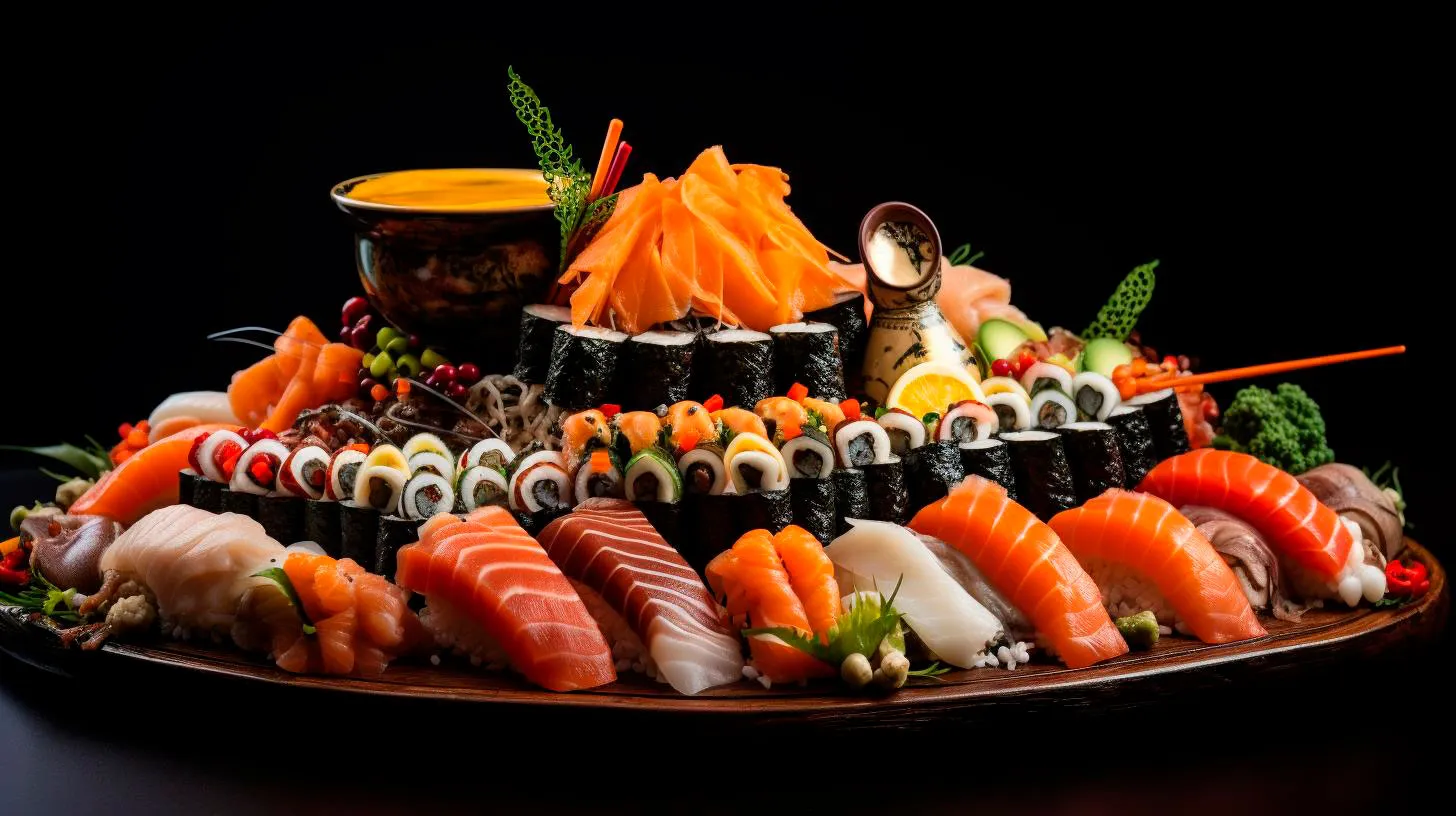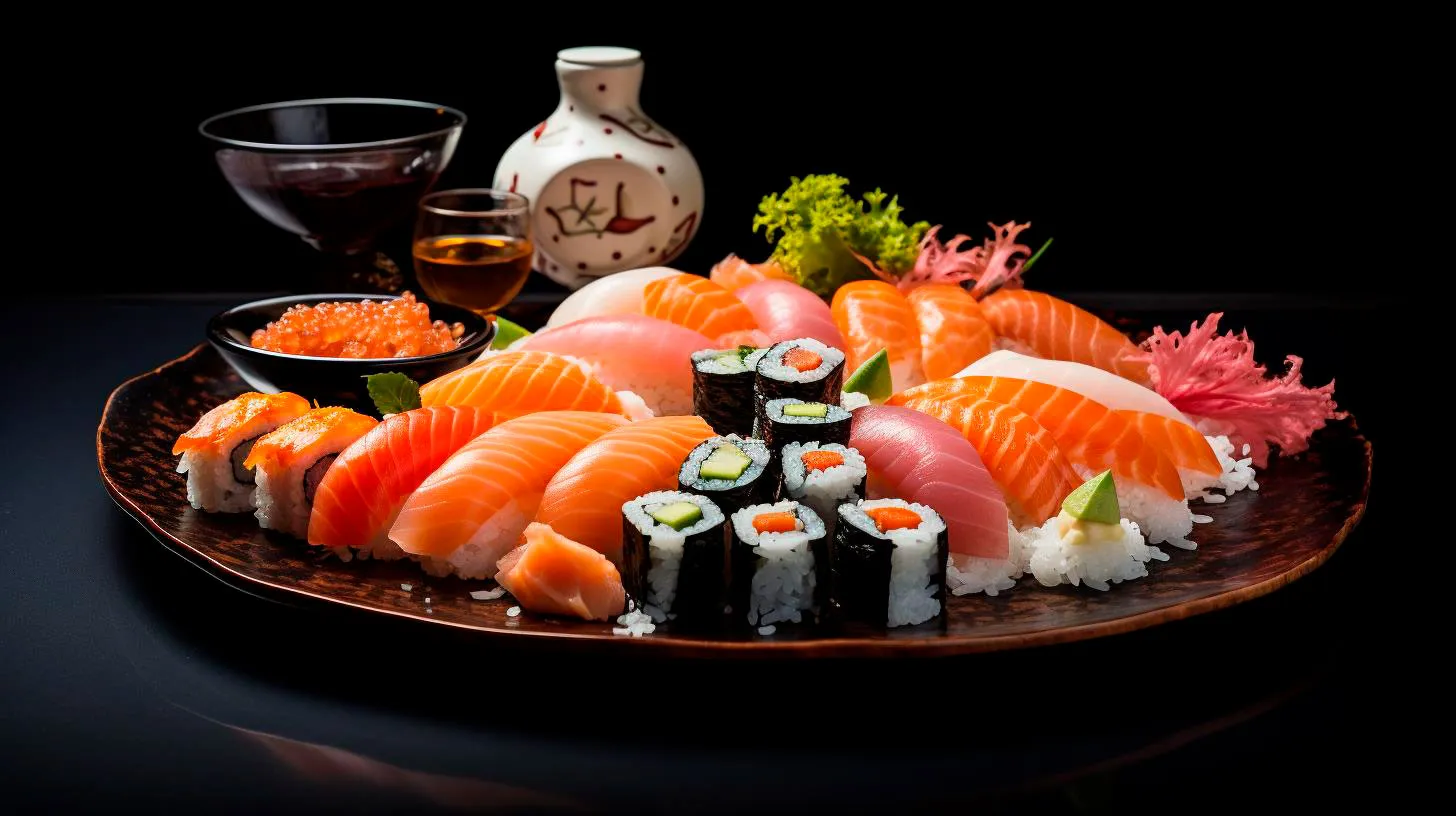Exploring the Harmony of Japanese Tea Rituals Nurturing Balance
In this article, we will delve into the significance of Japanese tea rituals, explore their key elements, and discover how they contribute to a more balanced and tranquil life.
The Significance of Japanese Tea Rituals
The Japanese tea ceremony, also known as chanoyu or sado, encompasses much more than a simple act of serving and drinking tea. It is a mindful and deliberate practice that embodies principles of harmony, respect, purity, and tranquility. The essence of this ritual lies in its ability to foster a deep appreciation for simplicity, beauty, and interconnectedness.
Key Takeaway: The Japanese tea ceremony teaches us to embrace simplicity, find beauty in the everyday, and appreciate the connections between ourselves, others, and the natural world.
The Elements of a Japanese Tea Ritual
Every aspect of a Japanese tea ceremony is meticulously planned and executed to create a serene and harmonious atmosphere. The following elements contribute to the unique experience:
Tea Room (Chashitsu)
The tea room is a dedicated space designed to provide a tranquil environment for the tea ceremony. Its minimalist aesthetic, with traditional tatami flooring, sliding doors, and subdued lighting, helps create a sense of calm and focus.
Tea Utensils (Chadogu)
The tea utensils used in a Japanese tea ceremony are crafted with precision and elegance. From the tea bowl (chawan) and tea scoop (chashaku) to the tea whisk (chasen), each item has a specific purpose and is cherished for its unique beauty.
Matcha Green Tea
The centerpiece of the Japanese tea ceremony is matcha, a powdered green tea. Matcha is made from shade-grown tea leaves, ground into a fine powder, and whisked with hot water using a bamboo tea whisk. It is known for its vibrant green color, earthy flavor, and numerous health benefits.
Key Takeaway: The tea room, the carefully selected tea utensils, and the vibrant matcha green tea all come together to create a sensory experience that nurtures tranquility and mindfulness.
Benefits and Takeaways from Japanese Tea Rituals
Participating in a Japanese tea ceremony offers a multitude of benefits and takeaways that extend beyond the enjoyment of tea. Here are some key reasons why this traditional practice continues to captivate people worldwide:
Promotes Mindfulness and Relaxation
- The deliberate and unhurried nature of the tea ceremony encourages participants to be present in the moment, fostering a sense of mindfulness and relaxation.
- The focus on simplicity and harmony helps individuals detach from daily stressors and find inner peace.
Cultivates a Sense of Connection
- The tea ceremony is often performed in small groups, facilitating intimate connections and fostering a sense of community.
- Participants engage in meaningful conversations and observe traditional etiquette, deepening their understanding of each other and fostering bonds.
Enhances Appreciation for Beauty
- The aesthetically pleasing tea utensils and serene tea room serve as reminders to appreciate beauty in everyday life.
- The careful preparation and presentation of matcha elevate the tea-drinking experience and encourage a heightened appreciation for the small details.
Promotes Overall Well-being
- The health benefits of matcha, including its high antioxidant content, can contribute to improved physical well-being.
- The mental and emotional respite provided by the tea ceremony can reduce stress and promote overall mental well-being.
Key Takeaway: Japanese tea rituals offer a holistic approach to well-being by promoting mindfulness, fostering connections, cultivating an appreciation for beauty, and supporting overall physical and mental wellness.
Incorporating Tea Rituals into Modern Life
Even though the traditional Japanese tea ceremony may seem inaccessible to some, its guiding principles can be incorporated into our modern lifestyles to nurture a greater sense of equilibrium. Here are some practical tips for incorporating tea rituals into your life:
Create a Tea Corner
Designate a small space in your home as a tea corner. Place a beautiful tea set, a small selection of high-quality teas, and a meditation cushion or comfortable chair. Use this corner as a sanctuary for moments of quiet reflection and tea enjoyment.
Practice Mindful Tea Drinking
Embrace the art of mindful tea drinking. Take time to fully engage your senses while preparing and savoring your favorite tea. Notice the aroma, the taste, and the calming effect it has on your body and mind. Use this ritual as an opportunity to disconnect from screens and distractions.
Host Tea Gatherings
Invite friends or family members to join you in a tea gathering. Observe traditional etiquette, share meaningful conversations, and create connections. Encourage each participant to bring their own unique tea set or tea leaves to enhance the experience.
Key Takeaway: By incorporating elements of a Japanese tea ceremony into our daily lives, we can cultivate a deeper sense of balance, mindfulness, and connection with ourselves and others.
In conclusion, the Japanese tea ceremony immerses participants in a ritual that nurtures harmony, tranquility, and connection. By embracing its philosophy and integrating its elements into our lives, we can find moments of balance in an increasingly fast-paced world.
Unveiling the Secrets of Japanese Tea Practices Achieving Optimal Wellness
In this article, we will explore the deep-rooted traditions of Japanese tea, its health advantages, and how you can incorporate it into your daily routine to achieve ultimate wellness.
The Essence of Japanese Tea
Japanese tea culture is an integral part of the country’s history and tradition. The most famous types of tea in Japan include matcha, sencha, and genmaicha. Matcha, a finely ground powder made from shade-grown tea leaves, is an integral component of tea ceremonies. Sencha, on the other hand, is the most commonly consumed everyday tea, characterized by its refreshing flavor and vibrant green color. Genmaicha is a unique blend of green tea leaves and roasted brown rice, giving it a nutty taste and aroma.
Whether you prefer matcha or sencha, Japanese teas are packed with essential nutrients and antioxidants, providing multiple health benefits that can enhance your overall well-being.
The Health Benefits of Japanese Tea
1. Rich in Antioxidants: Japanese tea contains high levels of catechins, a type of antioxidant that helps to protect the body against various diseases and promotes overall well-being. These antioxidants have been linked to providing anti-aging benefits by reducing oxidative stress in the body.
2. Boosts Metabolism: Studies have shown that the catechins present in Japanese tea can help increase metabolism, making it a great addition to a weight loss or weight maintenance regimen. By enhancing fat oxidation, Japanese tea can assist in achieving and maintaining a healthy body weight.
3. Enhances Brain Function: The amino acid L-theanine, found in abundance in Japanese tea, has been shown to promote relaxation and improve focus, alertness, and cognitive performance. Consuming Japanese tea can provide a calm and alert state of mind, perfect for work or study sessions.
4. Supports Digestion: The polyphenols present in Japanese tea have been found to aid digestion and promote a healthy gut. Regular consumption of Japanese teas, especially sencha, can help soothe gastrointestinal inflammation and improve digestive function.
Incorporating Japanese Tea into Your Daily Routine
Now that you are aware of the numerous health advantages of Japanese tea, it’s time to incorporate it into your daily routine. Here are a few simple ways you can enjoy Japanese tea:
- Start your day with a hot cup of sencha or genmaicha to kick-start your metabolism and provide a natural energy boost.
- Add matcha powder to your smoothies or baked goods for a nutrient-rich addition.
- Replace sugary beverages with a refreshing cup of cold brewed Japanese tea to stay hydrated throughout the day.
- Enjoy a traditional tea ceremony experience by sipping on a bowl of frothy matcha.
By incorporating Japanese tea into your daily routine, you can reap its incredible health benefits and enhance your overall wellness.
The Path to Optimal Wellness
In the pursuit of optimal wellness, adopting Japanese tea practices can be a game-changer. This ancient tradition not only provides numerous health benefits but also offers a moment of tranquility and mindfulness in our busy lives.
So, why not embark on this journey towards optimal wellness and start enjoying the delicious flavors and amazing health benefits of Japanese tea today? Your mind, body, and spirit will thank you for it!
Key Takeaways:
- Japanese tea practices are deeply rooted in tradition and culture, offering numerous health benefits.
- Japanese teas like matcha, sencha, and genmaicha are rich in antioxidants, which can promote overall well-being and combat aging.
- The catechins in Japanese tea can boost metabolism, enhance brain function, and support digestion.
- Incorporating Japanese tea into your daily routine can be as simple as enjoying a cup in the morning, adding matcha to your recipes, or replacing sugary beverages with cold brewed Japanese tea.
- Embarking on the path to optimal wellness with Japanese tea practices can bring tranquility, mindfulness, and a healthier lifestyle.
Experience the wonders of Japanese tea and unlock the secrets to achieving optimal wellness today!
Rejuvenating Your Body and Mind through Japanese Tea Ceremonies
In this article, we will explore the art of Japanese tea ceremonies, their history, and the numerous benefits they offer for overall well-being.
The History of Japanese Tea Ceremonies
Japanese tea ceremonies, also known as “chanoyu” or “sado,” have roots that trace back to the 9th century when tea was introduced to Japan from China. However, it was during the 16th century that the ceremonial aspect of tea drinking became popularized. Japanese tea ceremonies were influenced by Zen Buddhism, incorporating principles of harmony, respect, purity, and tranquility.
Today, Japanese tea ceremonies remain an integral part of Japanese culture and are considered a formal art form. Traditional tea houses, known as “chashitsu,” are purpose-built spaces where these ceremonies take place.
The Art of Japanese Tea Ceremonies
Japanese tea ceremonies are meticulously planned and executed, with each gesture and movement carrying meaningful symbolism. The ceremony is typically conducted by a host, or “chajin,” who prepares and serves matcha, a powdered green tea.
Here are some key elements and steps involved in a typical Japanese tea ceremony:
- Purification: Before the ceremony begins, participants are invited to cleanse their hands and mouths using a small water basin and ladle.
- Wagashi: Traditional Japanese sweets, called wagashi, are served before the tea is served. These sweets are carefully chosen to complement the flavor of the tea.
- Tea Preparation: The host prepares the matcha tea by whisking the powdered tea in a bowl with hot water. The tea is then served to the guests.
- Tea Etiquette: Participants express their gratitude towards the host and each other through various gestures and phrases, reflecting the principles of harmony and respect.
The Benefits of Japanese Tea Ceremonies
Engaging in Japanese tea ceremonies can bring about numerous benefits for both body and mind. Let’s explore some of these advantages:
1. Relaxation and Stress Reduction
During the tea ceremony, participants are encouraged to slow down, be present in the moment, and focus on their senses. This deliberate practice promotes relaxation and reduces stress, allowing individuals to find inner peace.
2. Mindfulness and Meditation
The deliberate and precise movements during a tea ceremony create a meditative atmosphere. By observing the host’s actions, participants can develop mindfulness and enhance their ability to concentrate, fostering a state of mental calmness.
3. Connection with Nature
Japanese tea ceremonies often take place in tranquil indoor spaces adjoined to gardens. These gardens are intentionally designed to reflect the beauty and serenity of nature. Immersing oneself in this environment provides a connection with the natural world, promoting a sense of harmony and balance.
4. Health Benefits of Matcha
Matcha, the powdered green tea used in Japanese ceremonies, is known for its health-promoting properties. It is packed with antioxidants, boosts metabolism, enhances concentration, and promotes relaxation without drowsiness. As a result, enjoying matcha regularly can contribute to overall well-being.
Key Takeaways
Japanese tea ceremonies offer a powerful and enlightening experience, allowing individuals to rejuvenate both their body and mind. By incorporating the principles of harmony, respect, purity, and tranquility, tea ceremonies promote relaxation, mindfulness, and a deeper connection with nature. The health benefits of matcha further contribute to overall well-being.
So, next time you find yourself in need of rejuvenation, consider embracing the ancient art of Japanese tea ceremonies. Set aside some time, find a quiet and peaceful space, brew a cup of matcha, and embark on a journey of tranquility and self-discovery.
Discover the Benefits of Japanese Tea Rituals Enhancing Health and Well-being
In this article, we will explore the profound benefits of Japanese tea rituals and how they can positively impact our health and overall well-being.
The History and Philosophy behind Japanese Tea Rituals
Japanese tea rituals trace their origins back to the 12th century when Zen Buddhism was introduced to Japan. The rituals were developed as a means to practice mindfulness, focus, and inner harmony. The philosophy behind these rituals emphasizes the importance of being present in the moment and finding tranquility through tea drinking.
The Ceremonial Preparation
The Japanese tea ceremony, known as “Chanoyu” or “Sado,” involves a carefully choreographed series of actions and gestures. The ceremony usually takes place in a traditional tea room, designed to create a serene atmosphere conducive to meditation. Key steps in the tea preparation process include:
- Heating and cleansing the tea utensils
- Preparing the tea whisk and tea bowl
- Measuring and whisking the powdered tea
- Serving and receiving the tea
Apart from the precision and attention to detail required, the tea ceremony promotes a sense of calmness and harmony. It encourages participants to slow down, appreciate the beauty of simplicity, and be fully present in the moment.
Physical and Mental Benefits
Engaging in Japanese tea rituals can have numerous positive effects on both our physical and mental well-being. Let’s explore some of these benefits:
Promotes Relaxation and Stress Relief
Japanese tea rituals offer an escape from the fast-paced modern world, providing a space to unwind, relax, and find inner peace. The deliberate and methodical nature of the tea ceremony helps to calm the mind and relieve stress. Studies have shown that regular tea drinking can reduce cortisol levels, the hormone associated with stress.
Boosts Focus and Concentration
The mindfulness required in Japanese tea rituals aids in improving focus and concentration. By focusing on each step of the ceremony and the senses involved, individuals develop a stronger ability to concentrate on the present moment, enhancing overall cognitive functioning.
Supports Digestion and Weight Management
Various Japanese teas, such as Matcha, are known for their potential health benefits. Matcha is high in antioxidants and has been linked to improved metabolism, digestion, and weight management. The ritual of consuming tea mindfully can also promote healthier eating habits and portion control.
Promotes Hydration and Detoxification
Including Japanese tea in your daily routine not only provides hydration but also assists in the body’s natural detoxification process. Many Japanese teas, such as Sencha and Hojicha, have detoxifying properties and can aid in flushing out toxins from the body.
Key Takeaways
Engaging in Japanese tea rituals goes far beyond simple tea consumption; it offers a holistic experience that benefits both the mind and body. By incorporating these rituals into our daily lives, we can enjoy:
- Relaxation and stress relief
- Improved focus and concentration
- Support for digestion and weight management
- Hydration and detoxification benefits
Embracing the art of Japanese tea drinking allows us to reconnect with ourselves, our surroundings, and find inner harmony amidst the chaos of daily life. So, why not incorporate a little Zen into your day and experience the numerous benefits Japanese tea rituals have to offer?



